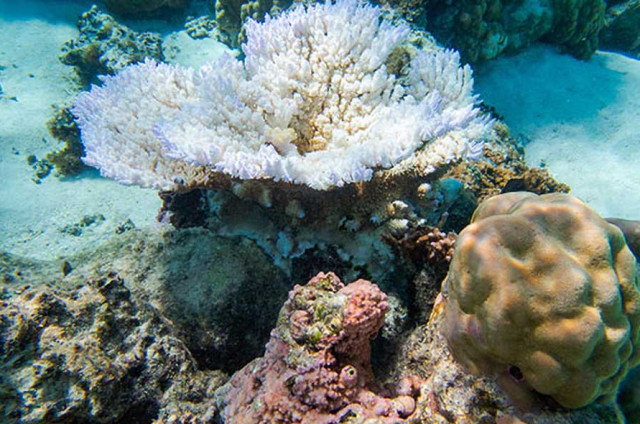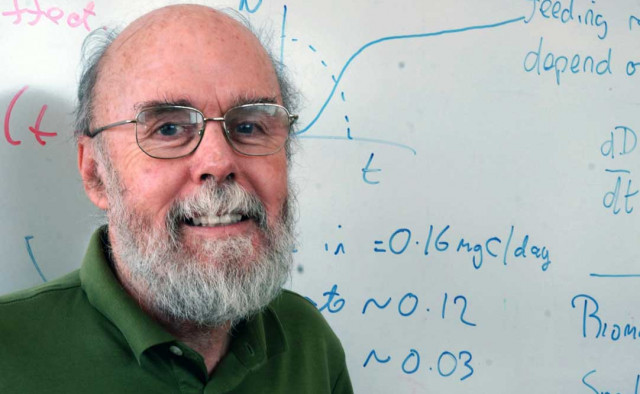On the Front Lines

By Sonia Fernandez
If the fight to get ahead of climate change was a battlefield, coral reefs would be on the front lines. The symbiotic relationship between alga and animal in these foundational ocean organisms has provided habitat and food for a dizzying array of species for millennia, weathering fluctuations in temperature, water chemistry, light availability and food supply.
“This whole vibrant ecosystem hinges on the presence of these foundation species, corals, which are probably one of the most fascinating groups of animals on the planet,” said UC Santa Barbara ecologist Holly Moeller. “A tropical coral reef is this vibrant, beautiful hotspot of biodiversity, rich with colorful animal life,” which in turn, she continued, yields benefits for surrounding ecosystems, as well as human activities. Adding to the complexity: The corals are actually composites of two living organisms. The coral animal plays host to symbiotic algae which help generate the coral’s food supply by harnessing sunlight via photosynthesis.
It’s no secret that corals are facing their biggest challenge on record, with ocean warming and acidification threatening the very relationship that makes these reefs possible. The increasing heat and changing chemistry of the water causes corals to expel their symbiotic algae, resulting in bleaching and the loss of most of the corals’ energy source, leading, in most cases, to coral death.

As disheartening as that sounds, for Moeller it also is an invaluable opportunity to witness phenomena that are fundamental to successful life on Earth: how animals respond to changing conditions. She, along with UC Santa Barbara theoretical ecologist Roger Nisbet, and researchers from the University of Rhode Island (URI), the University of Washington (UW), Florida International University (FIU) and Shedd Aquarium in Chicago, are set to investigate how corals are responding via epigenetics to the onslaught of changes to their environments. Their work is funded by a $3 million, five-year collaborative research grant from the National Science Foundation.
“Corals are the canary in the coal mine when it comes to climate change, and are valued in the order of hundreds of billions of dollars annually,” said Hollie Putnam, coral biologist at URI and lead investigator in the collaboration. “Better understanding their evolutionary processes and how they may acclimate through epigenetics may allow us to reduce the negative effects of events like mass bleaching and the impact the rapid loss of coral reefs has on our food security, coastal security and how the oceans impact our coasts.”
And ground zero for this investigation? The coral reefs around Mo’orea, in French Polynesia, which is home to the National Science Foundation’s Mo’orea Coral Reef (MCR) Long-Term Ecological Research (LTER) project. Under the direction of UC Santa Barbara marine scientist Russ Schmidt and Sally Holbrook, the MCR LTER has yielded years of ecological data on the structure and function of Mo’orea’s coral reefs at a time when coral reefs around the world are facing numerous threats.
“This will provide us amazing insights into the function of Mo’orea’s coral reefs at a critical time,” said Moeller, who specializes in symbiosis and modeling. Focusing on the corals’ epigenetics — heritable changes in an organism’s observable characteristics, in direct response to their environment, that do not alter their DNA codes — is particularly interesting, she said, because corals face changing conditions throughout their life cycles, employing strategies to rapidly evolve and adapt.

“Not only does a particular coral individual experience varied environments in its long lifespan, but when it produces babies, these babies get dispersed all over the reef and maybe to other reefs far away where conditions could be really different,” Moeller said. “How do organisms deal with this (at least partially) unpredictable environmental variation? And, how do they deal with this while still managing to make a living that includes wrangling a symbiotic alga that may or may not want to cooperate? We think epigenetic modifiers are one way to do this.”
Using the data gathered at Mo’orea, the collaboration, which includes FIU molecular biologist and environmental genetics expert Jose Eirin-Lopez, UW conservation physiologist Steven Roberts and Shedd Aquarium research biologist Ross Cunning, intends to build predictive models for coral reef ecology and evolution that connect energy metabolism at the cellular scale to epigenetic, physiological and ecological factors. They’ll do so by using Dynamic Energy Budget models pioneered by Nisbet, who noted that “confidence in predictions from these models requires rigorous tests using data from laboratory studies and from organisms in the natural environment. This project offers unparalleled opportunities for both.”
“I think our project sits right in the mix of a number of great researchers doing really important work on what the potential adaptations of corals to a future ocean may be,” Moeller said. “And with this detailed understanding, we’ll be better equipped to understand reefs elsewhere, and even extend the knowledge to other systems.”